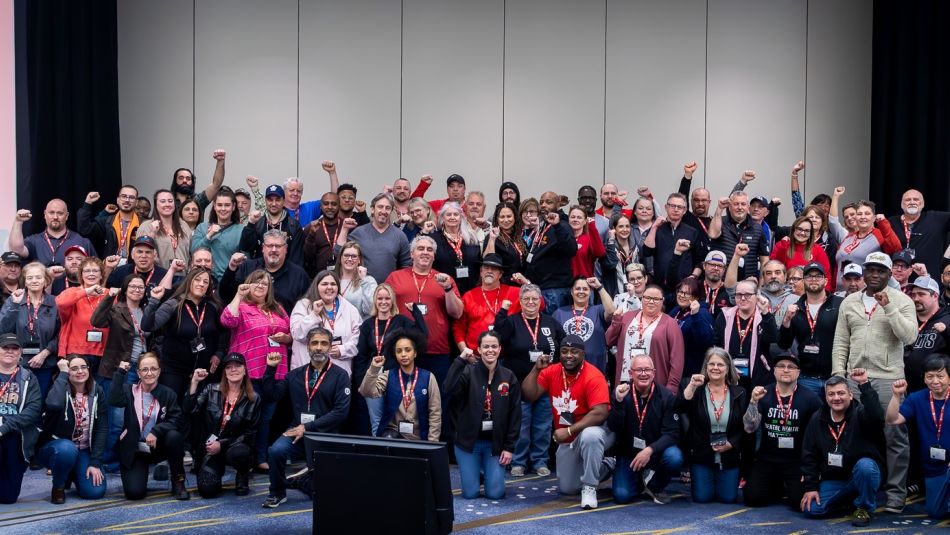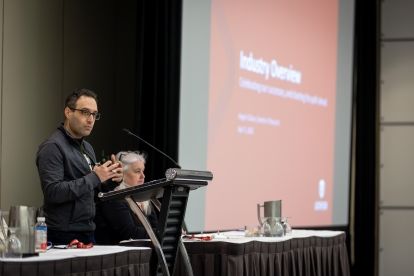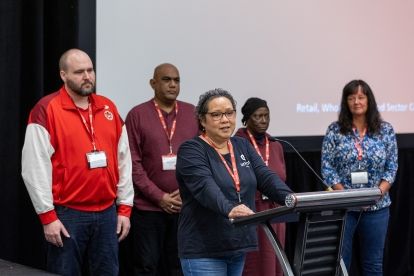
Share
More than 100 delegates from across Canada gathered at Unifor’s Retail, Wholesale, and Food Sector Conference to reflect on victories, from massive wage gains, to organizing success in warehouses and food processing, and look ahead to the next big battles: tariffs and defending Canadian jobs.
“This is a firestorm,” said Unifor National President Lana Payne in a passionate keynote. “All of us together, making this union bigger, stronger and prouder—and making sure that our country is bigger, stronger and prouder when we get through this trade war. We’ve survived every crisis by standing together—and we’ll do it again. There’s no one I’d rather be in this fight with than all of you.”
Payne praised the strength of Unifor members, highlighted past wins, and underscored the urgent need for collective action and political leadership that puts workers first.
Gord Currie, NEB Retail Representative and Local 414 President, summed up the moment: “Now’s the time to act. We’ve seen what happens when we show up—at Metro, at Sobeys, Loblaws, Amazon, and Walmart. We can raise the bar for everyone.”
Delegates to the conference, held April 4-6 in Etobicoke, Ontario, were welcomed by Retail Director Sharon Walsh, who began by framing the stakes.
“You’re the link between producers and communities. And it’s time employers and governments recognized that reality and respected you accordingly,” said Walsh.
Unifor Research Director Angelo DiCaro presented on Executing a Successful Sector Strategy. DiCaro laid out the case for a coordinated union-wide plan that connects the dots between bargaining, organizing, and advocacy—highlighting the need for a strategy that protects and builds good jobs, raises standards, and builds worker power across Canada’s highly integrated supply chains.
Delegates engaged in a timely panel discussion that linked union work to social issues and the importance of strong allyship in our collective fight for justice. Panelists Marissa Alexander from Food Secure Canada, Pam Frache from the Workers Action Centre, Syed Hussan from Migrant Workers Alliance for Change, and Alrick Leslie from Unifor Local 252 led this important dialogue, exploring how food insecurity, migrant justice, and racial equity intersect with workers’ rights—and why Unifor’s movement to create a society that puts people over profit must always lead with courage, compassion, and unwavering solidarity.
Throughout the conference, delegates reflected on the importance of tackling technology including automation, artificial intelligence, and surveillance that harm workers’ and fundamental rights—including the rise of body cameras in retail workplaces. These tools, marketed as safety solutions, often come with deeper concerns about privacy, stress, and control. Delegates made clear that the best way to ensure safety in the workplace is through adequate staffing, enhanced support for workers, and robust health and safety plans developed in coordination with the union.
A particularly emotional moment came when Margaret Henry and Hazel Harris, two Hudson’s Bay Company (HBC) e-commerce warehouse workers, shared their stories about the sudden liquidation of their workplace and incoming mass terminations.
“Their courage is a reminder of what’s at stake,” said Dwayne Gunness, Retail Council President. “And I want them—and every HBC worker—to know that Unifor has your back.”
Unifor recently slammed the HBC for awarding management bonuses as thousands of workers face termination and while the company publicly refuses to honour its severance pay obligations.
“We’ll fight for every penny you and your colleagues are owed,” continued Gunness.
Unifor continues to call for urgent reforms to federal insolvency laws to better protect workers, including raising the WEPP cap, expanding super-priority protections, imposing liability on directors for unpaid compensation, and creating a mechanism to ensure workers are made whole through trust-held funds or federal guarantees.
The conference wrapped with delegates coming together to draft a statement—a roadmap to the next phase of Unifor’s work to further organize and build the sector.
As Payne put it, “We don’t just survive crises—we organize through them. And we come out stronger.”
From warehouse floors to grocery aisles, to food, dairy, and beverage processing plants, the message from the weekend conference was clear: our strength is in each other. And together, we build the future.
See the photo album of the conference on Facebook.








